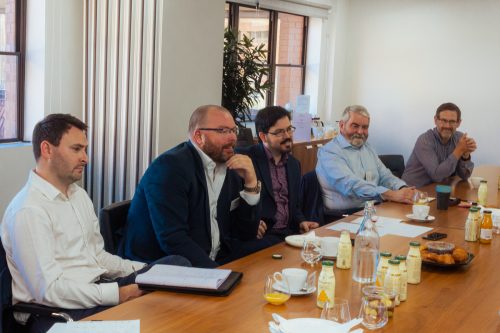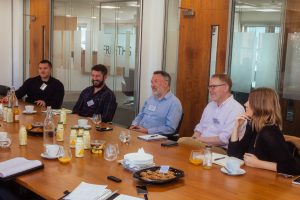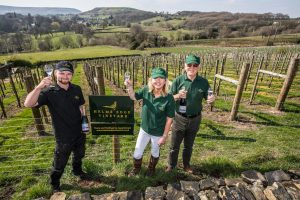Finding the right time to guard your ideas

Many start-ups face a tricky balancing act between secrecy and open-ness about their ideas.
Attendees at TheBusinessDesk.com’s breakfast roundtable on intangibles, at Freeths’ Leeds office, explored several different approaches to the problem.
While they accepted that medtech, biotech and semiconductor developers were “very much in the IP space”, for others the situation was not so clear cut.
Stuart Clarke, owner of Paceline Digital and founder of Leeds Digital Festival, believed the challenge was finding the sweet spot between sharing and protecting your ideas. Many firms wasted time and money trying to protect intellectual property, when they would be better served by sharing ideas with advisers, and with potential partners and funders.
Andy Francey, corporate partner at Freeths, felt timing was important, but not the only issue. “The challenge from my perspective is picking the right time for the right lawyer and/or accountants. Getting the right advive at the right time and finding someone who’s going to joining on the journey – finding the right partner on that journey.”
Ian Marshall, business advisory services manager at Sagars, said he was working on an Internet of Things start-up accelerator which included an 18-month IP track. “Right from the beginning you need to have an IP programme, or at least a process or a plan. Whether you’re registering things or not, at least haver an idea what you’re doing in that 18-month journey.”
Frank Suttie, commercial director at Freeths, said some founders worried about the cost of IP protection. “A lot of businesses need reassurance about what they’re doing and that some of what they’re looking for is not going to cost a lot. Your trademarks, for example. If you’re really trying to assert your independence then often they don’t understand the full protection from different types of IP such as trademarks.
“Another thing they worry about it confidentiality. Go to any credible lawyers and they will give you a non-disclosure agreement at a very reasonable cost, and hopefully give you some guidance on how to use it as well.”

TheBusinessDesk’s Intangibles roundtable at Freeths
Andy Robson, client director at Aon, said IP could be a valuable asset for attracting funding. “It’s not right for everyone, but we’re working with some companies where it’s opened a lot of doors for them. It’s transformed the business and put them in a very different position on a very, very different timescale to what they were originally working to.
“I’ve seen it again for an early stage company that growth has been accelerated because the valuation has pushed the business forward so much that it’s put it in a position to secure some funding.”
At the same time, warned Michael Collins, business development manager at Boost&Co, start-ups should be aware of what information they must share in order to obtain certain forms of IP. “If you’re in your early stage, is a patent the right option for you? You’re giving someone a recipe and they could change a few ingredients and then, all of a sudden, they’re not really infringing your patent but they’re doing something extremely similar.”
“IP is just one of a suite of things that you can use to talk about building a moat around your business,” Ian Marshall of Sagars added. “You can use your brand, and you can use the people, and you’ve got your USP.”
The Intangibles roundtable was organised by The BusinessDesk, sponsored by Freeths, Aon, Sagars and Boost&Co, and hosted at Freeths’ Leeds office.









